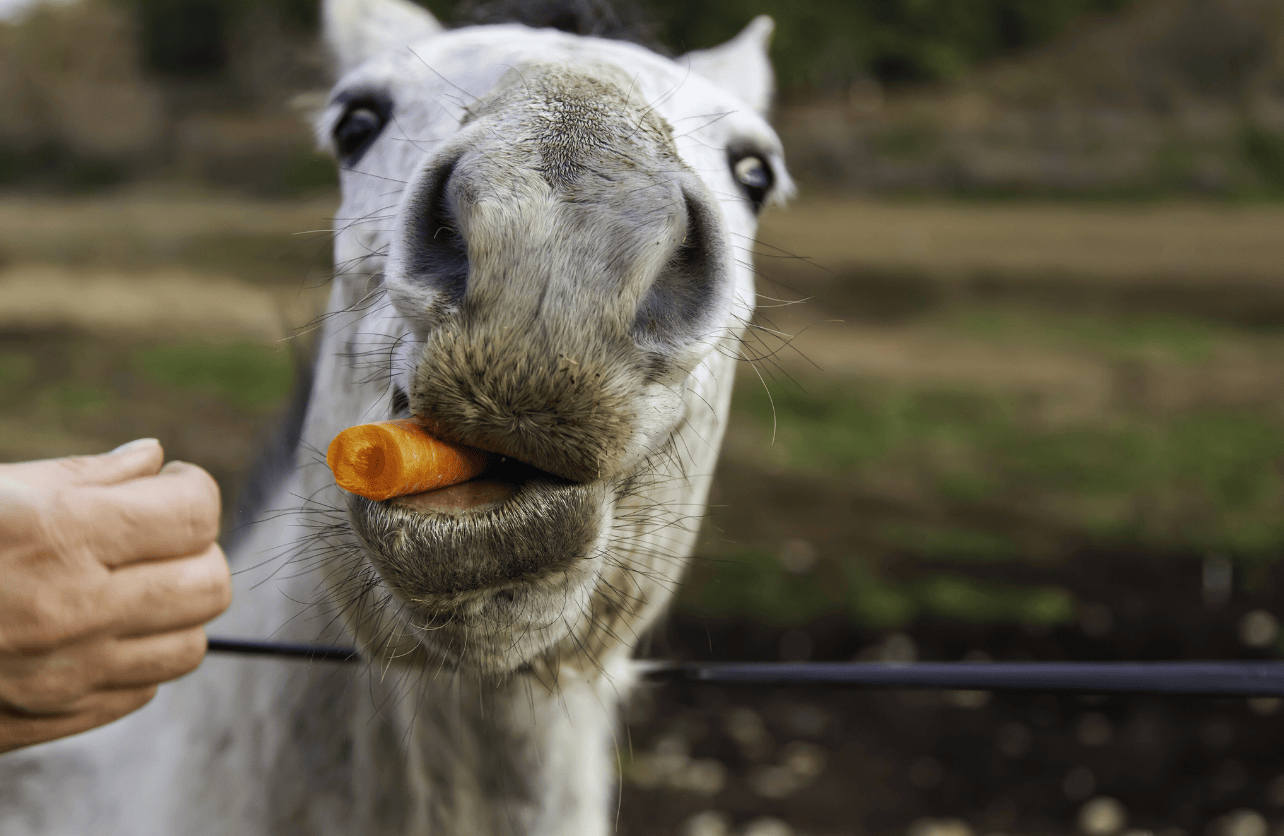What Do Horses Eat?

Horses are herbivores with a digestive system designed for grazing and processing plant-based foods. Their dietary needs are specific, requiring a balance of fiber, nutrients, and hydration to maintain health and energy levels. Whether you’re caring for a pasture horse or a high-performance athlete, understanding what horses eat and how to feed them properly is essential. This guide will walk you through the key components of a horse’s diet and important feeding considerations.
The Foundations of a Horse’s Diet
A horse’s diet primarily consists of forage, supplemented with concentrates, fresh treats, and ample water. These components mimic their natural grazing habits, ensuring their digestive system functions optimally.
Forage: The Mainstay of a Horse’s Diet
Forage should form the majority of a horse’s daily intake, providing essential fiber and nutrients.
- Pasture Grass:
Horses in natural environments graze on a variety of grasses. Quality pasture grass contains the nutrients they need for maintenance and light activity. However, overgrazed or poor-quality pasture may require supplementation with other feeds. - Hay:
When pasture is unavailable, hay becomes the primary forage source. Popular types include timothy, alfalfa, and orchard grass.- Timothy Hay: High in fiber and low in protein, making it ideal for most horses.
- Alfalfa Hay: Richer in protein and calcium, suitable for horses with higher energy needs.
- Orchard Grass: A softer hay option that’s palatable and nutritious.
Ensure hay is clean, free from mold, and stored in a dry, ventilated space to maintain quality.
Concentrates: Supplemental Energy and Nutrients
Concentrates provide additional calories and nutrients for horses with higher energy demands, such as performance horses or pregnant mares.
- Grains:
Oats, barley, and corn are common grains fed to horses. Oats are the most popular due to their digestibility, while corn provides higher energy density. Careful portion control is essential to prevent digestive issues. - Commercial Feeds:
These are formulated to meet specific nutritional needs, often combining grains, vitamins, and minerals. Commercial feeds are available for various life stages and activities, such as senior horses or high-performance athletes.
Fresh Fruits and Vegetables: Treats with Care
While forage and concentrates make up the bulk of a horse’s diet, fresh produce can be a delightful treat when given in moderation.
- Safe Options:
Carrots, apples, and bananas are classic favorites. They’re not only tasty but also provide vitamins and hydration. - Moderation is Key:
Treats should account for a small percentage of the diet. Overfeeding fruits or vegetables can upset the balance of their digestive system. - Foods to Avoid:
Certain foods, like onions, potatoes, chocolate, and avocado, are toxic to horses and should never be offered.
Water: The Most Essential Nutrient
Water is vital for all bodily functions, from digestion to temperature regulation. An average adult horse drinks between 5 to 10 gallons of water daily, with needs increasing in hot weather or during heavy work. Providing fresh, clean water at all times is critical to maintaining hydration.
Feeding Considerations
Feeding a horse isn’t just about what they eat—it’s also about how, when, and why they eat.
- Grazing Behavior:
Horses are natural grazers, designed to eat small amounts throughout the day. Providing multiple smaller meals, or allowing free-choice access to forage, mimics their natural feeding pattern and supports digestive health. - Fiber is Key:
At least 50% of a horse’s diet should come from forage. High-fiber diets promote healthy gut bacteria and reduce the risk of colic, a potentially life-threatening condition. - Tailored Diets:
Factors like age, workload, metabolic rate, and health status influence dietary needs. For example:- Senior horses may require softer, easily digestible feeds.
- High-performance horses need energy-dense concentrates.
- Easy keepers might benefit from lower-calorie forage to prevent obesity.
- Introduce Changes Gradually:
Sudden dietary changes can disrupt the digestive system. Transition new feeds over 7 to 10 days to allow your horse’s gut to adjust. - Monitor for Health Issues:
Regularly check your horse’s body condition, coat quality, and behavior for signs of dietary imbalance. Consult with a veterinarian or equine nutritionist if you notice changes.
Summing Up
A balanced diet is the foundation of a healthy, happy horse. By providing high-quality forage, appropriate supplements, and fresh water, you can ensure your horse thrives, whether they’re a leisurely pasture pet or a competitive athlete.
Understanding your horse’s specific needs and maintaining consistency in their feeding routine will help you build a strong, lasting bond while supporting their overall well-being.
Your Pet’s Best Interest, Always
At Pet Institute, we take pet care seriously. We're dedicated to transparency, impartiality, and the well-being of your pets in every article, review, and recommendation we provide. Our unwavering commitment to these principles ensures that you, our valued reader, always receive reliable and unbiased information. Let us be your trusted guide in the world of pet care and companionship.